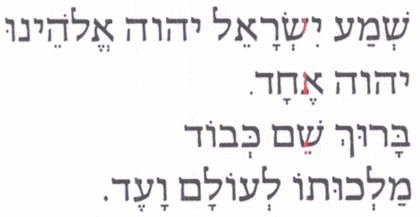Shabbat Gathering: The ritual of Shema.

Dear Chevra, as is our custom, we will gather tonight at 5.45p ct to welcome Shabbat. These are the coordinates:
Zoom
Meeting ID: 963 5113 1550
Password: 1989
Phone: +1 312 626 6799
(To unsubscribe from the newsletter, click the link at the very bottom of this email.)
Here we go.
Rituals.
For me, the daily religious ritual I’ve observed the longest is chanting the night time Shema. There are elaborate versions of this ritual, but my practice is child-like simple. I take off my glasses, stand by the side of my bed, face towards Jerusalem, cover my eyes with my right (non-dominate) hand, and chant out loud the three opening lines. (If you haven’t ever noticed, the three opening lines are coincidentally a haiku.) I say the second verse of the Shema quietly, under my breath. Afterwards, I clamber into bed, tuck myself in, and start making a list in my head of all the things that have happened to me during the day I’m grateful for. And this is how I fall asleep. As far as I know, there is nothing in the formal ritual that says the Shema should be said standing or that it should be said facing Jerusalem. This is just my own personal minhag (practice).
The Shema is one of the two central prayers of a typical service. (The other is the Amidah.) The text of the Shema is a simple instruction and declaration: “Hear O Israel. The Lord is G-d. The Lord is One.” There have been an infinite number of drashes delivered about the Shema. There are even whole books about the Shema. (I have one published by the Renewal movement.) Let’s focus on opening words which are taken from Deuteronomy 6:4.
Looking at the words.
Taken together, the words are an instruction and a declaration: “Hear…,” is the instruction. The word “Israel” can be read literally and / or metaphorically. It could be read as all of us in actual Israel. Metaphorically, it could also mean to include all of us in the diaspora and even those of us in the galut, exile. Or, we can widen our view to include our fellow travelers (gentiles) who are included in our nation according to Torah.
Then comes the declaration that G-d is G-d. Now, this might appear to be a tautology, but only because we live in, for the most part, a monotheistic society and world. At the time of the Shema’s writing, this was not so much the case. And yet, in our contemporary society, in which money is worshiped, and “going viral” is worshiped, it might be important for us to remember that it is only G-d who / that can be G-d.
Then, to put a finer point on the instruction, we are told that G-d is one. And this is key to me as a convert. I come from a religious tradition (Christianity) where the oneness of G-d is rather muddled (see the trinity). For me, avowing that G-d is one, is essential.
For me, ritual is a deliberate way for me to instill the divine into my life, on a regular basis. Chanting Shema is a reminder of my priorities and a signal that, at least for the moment, I’m aligned with those priorities. And that a very good feeling indeed.
And may it be for all of us a blessing.
See you tonight!
Gut Shabbes!
All my love,
brian.

PS
Call me a romantic. (I've been called worse.) I believe in the idea of having a bashert, a chosen soulmate, a bashert. Here's more on what that means for a Jew from My Jewish Learning.

-30-
